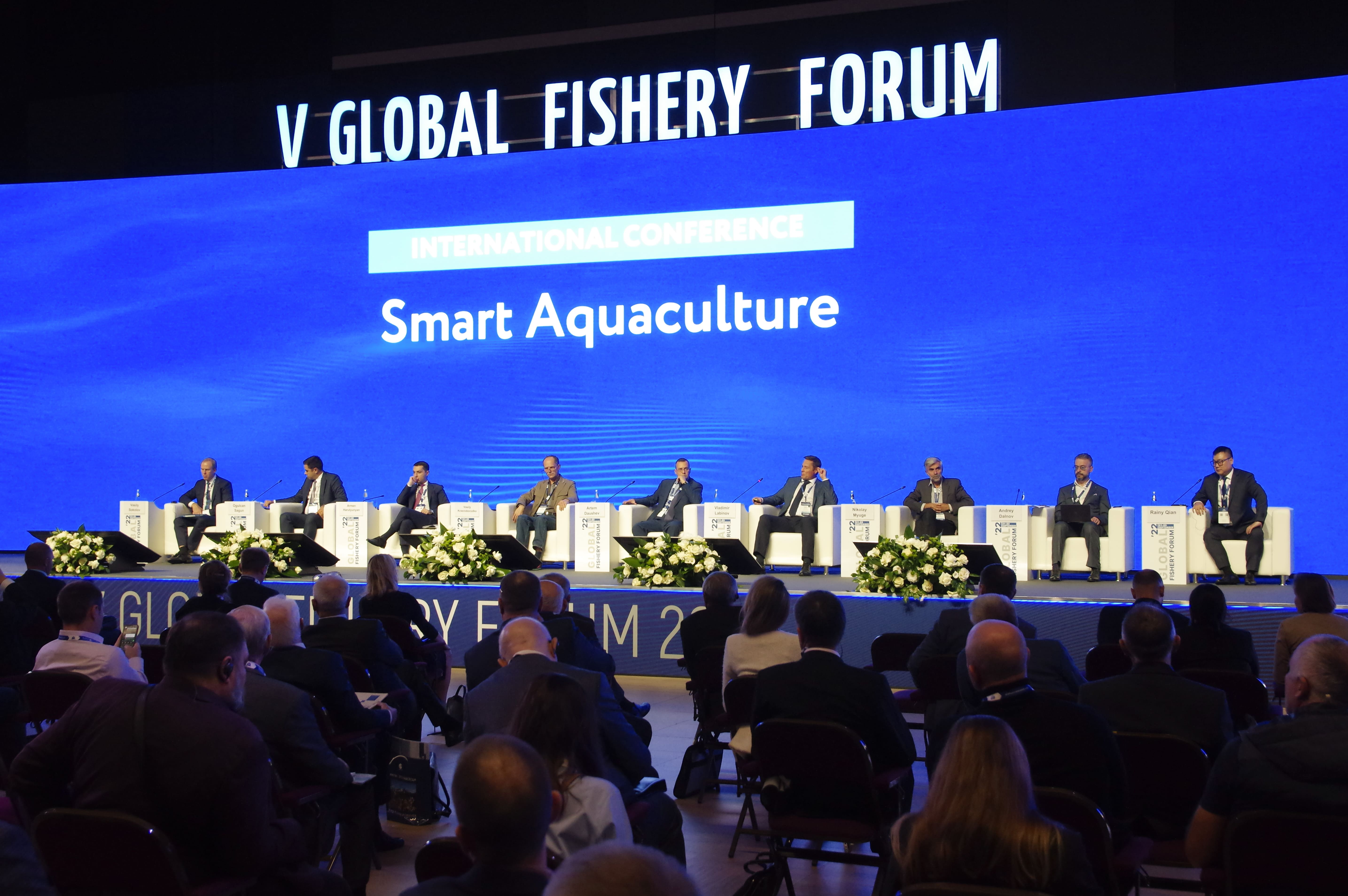September, 17-19, 2024, Saint Petersburg

The ‘Smart Aquaculture’ international conference was the cornerstone event of the business programme at the second day of the V Global Fishery Forum in St. Petersburg. Opening the discussion, Federal Agency for Fisheries Director Ilya Shestakov noted the importance of introducing eco-friendly technologies, including the development of a new sector for Russia, specifically the large-scale production of recirculating aquaculture systems (RAS), which will help increase the production of marketable fish without any environmental or climatic restrictions. This will make it possible to achieve strategic targets for the production of commercial aquaculture in response to market demand, especially amidst the need to accelerate import substitution.
“Aquaculture is one of the growth points for the entire food sector around the world and a driver for the industry’s development in Russia. The FAO predicts that the share of aquaculture will exceed that of industrial fisheries. The share of aquaculture is definitely growing each year. Over the past seven years, this segment has been steadily developing in Russia at a growth rate of 10% per year. As for ‘smart aquaculture’, I would like to emphasize the need for a balance between the economy and the environment as well as the equal interests of fishermen and fish farmers, which is achieved through effective regulation and introducing new technologies that are more eco-friendly, as well as through projects that help increase production regardless of water constraints,” he said.
Shestakov said he held a meeting with his colleagues from Turkey on the previous day of the Forum, at which they discussed new investment projects to raise salmon in the Black Sea.
“We share the Black Sea with Russia, and this provides us additional opportunities for joint growth,” Group Sagun Vice President Oguljan Sagun said. The company is one of the largest salmon producers in Turkey.
Deputy Director of the Federal Agency for Fisheries Vasily Sokolov, who moderated the conference, said that Russia is currently looking at ways to develop cooperation with China in order to build new modern production facilities and meet the demand for eco-friendly compound feeds with a high protein content. A few days prior to the Forum, the Russian government decided to subsidize 20% of expenses associated with the construction or renovation of workshops for the production of feed for valuable species of salmon and sturgeon.
During the conference, Famsun General Manager CEO Raini Kwan presented equipment that can be used to set up the fully robotic production of compound feed for aquaculture.
“I really hope that our colleagues and foreign partners will help us support production in the coming years. Negotiations are underway with your company at several aquaculture farms to set up production in Russia with turnkey plants. Demand on the Russian market amounts to roughly 200,000 tonnes per year. Taking into account the support measures that the government has introduced, I hope that we will have these plants in the near future,” Sokolov said.
The Eurasian Economic Community (EurAsEC) is considering new financial instruments to meet the aquaculture industry’s demands for eco-friendly feed. “Today, the Eurasian Commission is also mulling the possibility of attracting financial resources from the Eurasian Development Bank, which would be used for cooperation and integration projects in our union,” said Armen Harutyunyan, Director of the Agricultural Policy Department of the Eurasian Economic Commission.
At the initiative of the Federal Agency for Fisheries, common principles and approaches are being developed jointly with EurAsEC countries to ensure the sustainable development of aquaculture and fisheries.
Shestakov noted that fishery science and specialists from industry-specific universities provide huge support for the development of aquaculture in Russia. Branches of the Russian Federal Research Institute of Fisheries and Oceanography (VNIRO) are working on technologies to raise new species in different basins. Preparations are underway to introduce the large-scale cultivation of shrimp, crayfish, new types of molluscs, and the industrial cultivation of kelp. Specialists from the Pacific branch of VNIRO have launched experiments to raise cockerel and ark clams at fish farms. Scientists have already created biotechnologies for the production and reproduction of commercial products from kelp, wakame, and oysters.
“We have huge hopes for our young scientists. For example, specialists from Astrakhan State Technical University have developed a system that can raise fish, crayfish, and shrimp jointly with plants right in your apartment,” Shestakov said.
During the conference, Shestakov asked developers to purchase a prototype. “It’s really interesting – you can raise fish, and then grow plants based on the waste. So it’s like having a mini-greenhouse and a mini-aquarium in your home,” he said. An aqua garden can provide food for a family of four. During research, scientists have raised various types of aquatic organisms, such as tench, tilapia, sterlet, Australian red claw crayfish, and freshwater shrimp, together with agricultural crops.



